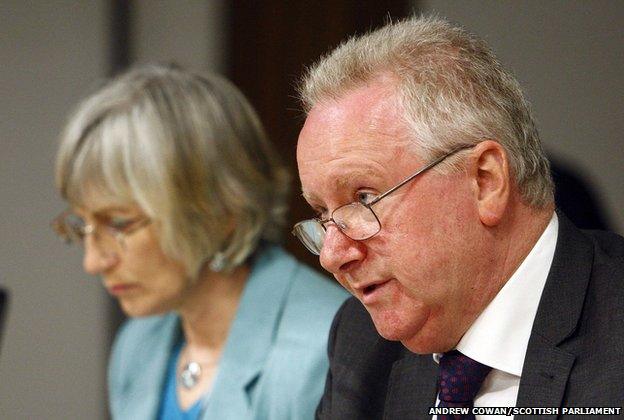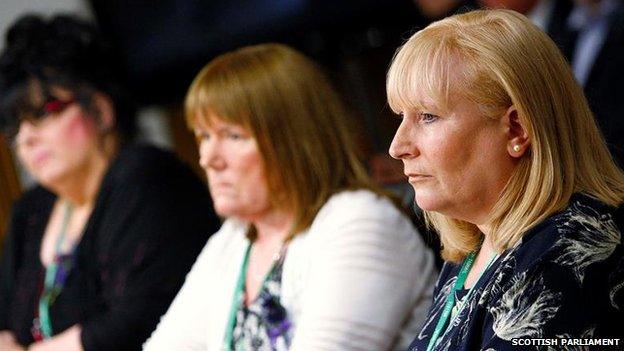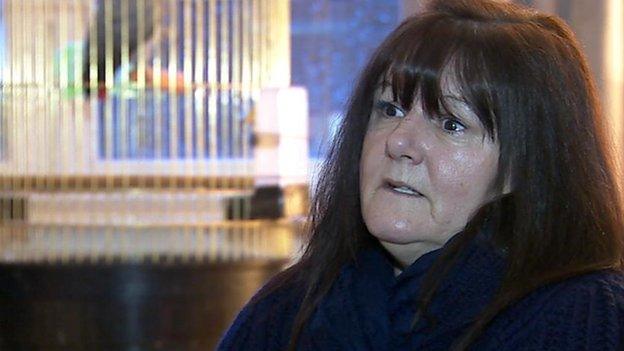Scottish Health Secretary Alex Neil requests mesh implant suspension
- Published

Health Secretary Alex Neil outlined a series of measures when he appeared before MSPs
Scottish Health Secretary Alex Neil has requested a suspension in the use of mesh implants by the NHS in Scotland, pending safety investigations.
Some of the women who received the procedure, which is used to ease incontinence, have suffered painful and debilitating complications.
Mr Neil told MSPs he was "deeply troubled" by the issue and was setting up an independent review.
Campaigners said his decision was unexpected, but welcome.
Several of Scotland's 14 regional health boards said they would agree to the health secretary's request, while others explained that they had not used the procedure in some time.
The Scottish government said it would hand a dossier of Scottish cases to the Medicines and Healthcare products Regulatory Agency (MHRA), which would have the final say on the use of mesh implants on a UK-wide basis.
A MHRA spokesman said its research showed that while a small number of women had experienced distressing effects, the benefits of these tapes and meshes outweighed the risks and could help in dealing with upsetting conditions such as urinary stress incontinence and pelvic organ prolapse.

EXPLAINER - Mesh implants

Health Secretary Alex Neil has called for the suspension of mesh implant operations. But why? Find out how the procedure has blighted the lives of some women.

About 1,850 women have the procedure in Scotland every year.
The health secretary said he had asked Scotland's acting chief medical officer, Dr Frances Elliot, to write to health boards with a request to immediately suspend the procedures until further evidence from both the Scottish government review, and a European Commission investigation into mesh implants, external, became available next year.
Harrowing evidence
"I believe that is the right thing to do, and that we should base any future decisions on the evidence as presented by these two reports," said Mr Neil.
The health secretary said his suspension request extended to both tension free vaginal tape (TVT) and pelvic organ prolapse (POP) procedures.
Mr Neil's decision came after the Scottish Parliament's petitions committee previously heard harrowing evidence about women who suffered life-changing side effects after undergoing the procedure.
Some have been left in constant pain after the implants hardened, and told they could never have sex again.
Appearing before the committee on Tuesday, Mr Neil said: "We should all be very concerned to hear how these implants have affected the lives of some women in Scotland and elsewhere.
"I've personally met with women who've been adversely affected, and I was deeply troubled to hear how women affected have suffered, and they have my full sympathy and support and we'll certainly do everything we can to improve the situation.
"No one should have to experience the level of suffering that some of these women have had."

How health authorities have responded to the Scottish government request
NHS Highland said it had received Dr Elliot's letter and would act on the advice given.NHS Greater Glasgow and Clyde said it had not yet received the letter, but would comply with any guidance on mesh implants.
NHS Ayrshire & Arran said it would act on the Scottish government guidance.
NHS Forth Valley said it stopped using vaginal mesh implants in 2011, adding: "We continue to use tension free vaginal tape which research has shown to be safe and very effective."
NHS Dumfries and Galloway, said: "NHS Dumfries and Galloway has not carried out mesh procedures for pelvic floor reconstruction for some time and we do not plan to undertake this surgery in the foreseeable future."
NHS Fife associate medical director Dr Gordon Birnie, said: "NHS Fife has not used mesh for the treatment of pelvic organ prolapsed for a number of months, although the material has still been used for tension free vaginal tape procedures. However, in light of the publicity surrounding the health secretary's announcement, we have taken a decision to postpone all such procedures until further notice."
NHS Tayside said it had not yet received the letter, although the authority added that it got an email from Dr Elliot, sent to all health boards, asking whether there had been discussions on suspending mesh implant procedures.
NHS Lothian said they had not received the letter.
NHS Borders Medical Director, Dr Sheena MacDonald, said: "We understand that further communication will be forthcoming from the Scottish government, which will be considered with appropriate action taken as required."
NHS Western Isles said it was addressing the action noted in the letter
NHS Grampian said they had not received the letter but had been told it would arrive this week at some point. They said they would normally comply with this type of guidance. "We have noted the announcement by the Cabinet Secretary and will give the most urgent consideration to the letter from the Acting Chief Medical Officer."
NHS Shetland said its gynaecology services were provided by NHS Grampian and it would be following their policy and procedures.
NHS Orkney are thought to be in same position as Shetland
NHS Lanarkshire said they were aware of the chief medical officer's letter, but had not received it yet. They will review the contents of the letter when they do.
NHS Greater Glasgow and Clyde said they had not received the letter. They say they await it and would comply with any guidance it offered on mesh implants.

Transvaginal mesh implants are usually used to treat a prolapsed bladder and relieve incontinence, often as a result of childbirth.
Hundreds of mesh implant-related claims are due before the Scottish courts within the next year, with cases already under way in the US and Canada, where the authorities have issued warnings to hospitals.
The Scottish Mesh Survivors campaign group had previously called for a suspension, pending an inquiry.
Mr Neil said estimates over the success of the procedure indicated that most women, about 1,450, did not appear to suffer complications, but he warned the figure was "not entirely reliable", because of the under and non-reporting of problems.

Olive McIlroy, centre, and Elaine Holmes, who have both received surgical mesh implants, previously raised the issue in parliament
One Scottish health authority, Dumfries and Galloway, has already suspended the use of mesh implants, saying it had not used them for some time and had no plans to in the foreseeable future.
The health secretary said a series of other measures were being taken, including:
A working group involving clinicians and patient representatives had produced a patient information booklet on the risks an alternatives to mesh implants.
New patient guidance was being developed to help with women who come forward with complications.
The Scottish government will hand a dossier of Scottish cases to the Medicines and Healthcare products Regulatory Agency (MHRA), which would have the final say on the use of mesh implants on a UK-wide basis.
In the last year, Scotland's chief medical officer wrote to GPs three times, alerting them to possible risks.
Scottish ministers will take part in a UK working group on mesh implants.
An MHRA spokesman said it had asked the Scottish government to provide any new evidence it had for assessment.
He said: "We have listened to and understand the concerns that many women have about vaginal tapes and meshes.
"That's why we commissioned and published independent research in 2012 that reviewed the available evidence about the safety and adverse effects associated with vaginal tapes and meshes.
"The findings showed that while a small number of women have experienced distressing effects, the benefits of these tapes and meshes outweigh the risks and can help in dealing with upsetting conditions such as urinary stress incontinence and pelvic organ prolapse."
Campaigner Olive McIlroy, who brought the matter to the attention of the petitions committee after suffering from mesh implant complications, said: "I just didn't expect that decision today.
"It was the decision that we were hoping for and we're very glad that the minister made it, but he could have made it a year ago."
The 57-year-old described MHRA regulations as "completely flawed", adding: "We welcome that there is going to be an independent review and there will be no manufacturers or anyone with a vested interest involved.
"It has been too long. Our alternative evidence has been there for all to see, but nobody has listened."
Mr Neil said he hoped to announce the chair and remit of the Scottish government inquiry before the Holyrood summer recess.
Decision 'delay'
Lindsay Bruce, from Thompsons Solicitors, who represents many of the women who have been harmed by surgical mesh implants, welcomed the government's action, adding: "We hope the Scottish government will make sure that, in future, any surgical implant like mesh is subject to the same kind of rigorous testing that new medicines go through before they're given to the public."
The Conservatives and Liberal Democrats welcomed the health secretary's decision.
Labour health spokesman Neil Findlay, added: "My Scottish Labour colleagues and I joined with the many women affected by mesh implants to call for suspension 12 months ago, so why has it taken so long for the cabinet secretary to act?
"His delay means that approximately 1,800 more women have been fitted with a product that many people believe is causing severe injury and life-changing side effects to women in Scotland."
- Published19 December 2016

- Published3 June 2014

- Published11 March 2014
